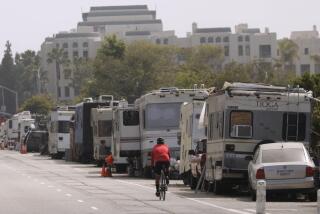Legalize L.A.’s street vendors
The bacon-wrapped hot dog may be the iconic L.A. street food, but the guy selling it is a criminal.
Whether hawking hot dogs, T-shirts, sodas or fresh fruit, vending on sidewalks and parkways is illegal in the city of Los Angeles. This law, of course, is widely ignored, especially in neighborhoods such as MacArthur Park, Van Nuys and downtown, where vendors and their customers turn the public right of way into unregulated food courts and marketplaces. Occasionally, city police and inspectors will swoop in to ticket or arrest vendors and break up commerce, only to have it resume soon after.
It’s an ineffective and unsafe system that ignores the opportunity to foster a vibrant street culture. So several years ago, community activists and immigrant rights groups began a campaign to bring vendors out of the shadows, and their work has begun to pay off. This week, City Councilmen Jose Huizar and Curren Price introduced a motion calling for a study of how L.A. can legalize vending on sidewalks.
There are an estimated 10,000 street vendors working in Los Angeles County, and advocates say a large percentage of them are within the city of Los Angeles. Given the significant economic and cultural impact of street vending in some communities, it’s shocking that the city has waited so long to legitimize vendors. Worse, even food vendors who are eager to play by the rules — who get a health permit from the county’s Street Vending Compliance Program — face fines, confiscated equipment or jail because the city bars them from selling their goods on the sidewalk.
Certainly, there are real issues to address before L.A. legalizes street vending. Here are a few things officials should consider:
Los Angeles County will need to expand its inspection system to ensure that food sold by a permitted vendor is prepared in a safe, healthy manner; permitted vendors should face the same random inspections as restaurants and food trucks. Pushcart operators should pay reasonable licensing fees as well as taxes, and be responsible for their garbage and community impact. The city will need a strong enforcement program to weed out scofflaws.
Brick-and-mortar businesses may have concerns about competition; they must be part of the discussion. The city may want to consider capping the number of vendors in any particular area for sidewalk safety.
And L.A. — a city notorious for red tape — will have to create a permit system that doesn’t burden vendors with so much regulation that they go back underground.
These issues can, and should, be resolved. New York, Chicago, San Francisco — all regulate and permit street vendors. It’s time for L.A.’s laws to catch up with L.A.’s culture.
More to Read
A cure for the common opinion
Get thought-provoking perspectives with our weekly newsletter.
You may occasionally receive promotional content from the Los Angeles Times.










